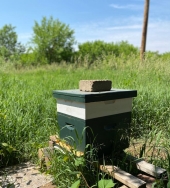
 1
1




I'm a California transplant living solo on 30 acres in a remote part of the Ozarks of Arkansas. Cohabitants include dogs, goats, barn cats and chickens.
 3
3




 4
4




Argue for your limitations and they are yours forever.
 2
2




Sometimes the answer is nothing

 2
2




Come join me at www.peacockorchard.com
 4
4





Gardens in my mind never need water
Castles in the air never have a wet basement
Well made buildings are fractal -- equally intelligent design at every level of detail.
Bright sparks remind others that they too can dance
What I am looking for is looking for me too!

 5
5




Argue for your limitations and they are yours forever.




Gardens in my mind never need water
Castles in the air never have a wet basement
Well made buildings are fractal -- equally intelligent design at every level of detail.
Bright sparks remind others that they too can dance
What I am looking for is looking for me too!

 2
2




I'm a California transplant living solo on 30 acres in a remote part of the Ozarks of Arkansas. Cohabitants include dogs, goats, barn cats and chickens.
 2
2




wayne fajkus wrote:I use a bee jacket that includes a hood, and gloves. This works well for me. Bottom is protected with pants socks, shoes .
I've never used a full body suit so I can't comment on them.
$10.00 is a donation. $1,000 is an investment, $1,000,000 is a purchase.




Myrth
https://ello.co/myrthcowgirl

 2
2




 3
3




$10.00 is a donation. $1,000 is an investment, $1,000,000 is a purchase.

 2
2




Cécile Stelzer Johnson wrote:I ran to the end of the property and they quit when I stuck my whole body in a gracious white pine.
 2
2




Joseph Lofthouse wrote:
Cécile Stelzer Johnson wrote:I ran to the end of the property and they quit when I stuck my whole body in a gracious white pine.
My apiary is next to a grove of juniper trees. They have become one of my favorite beekeeping accessories ever. It's so easy to back into a juniper tree whenever I wish to be forgotten by the bees.
$10.00 is a donation. $1,000 is an investment, $1,000,000 is a purchase.
 4
4




Myrth
https://ello.co/myrthcowgirl
 3
3




Argue for your limitations and they are yours forever.
 2
2




Mike Barkley wrote:Those do sound like they might have been Africanized bees. That would be a heck of a way to start learning about beekeeping.
Moderator, Treatment Free Beekeepers group on Facebook.
https://www.facebook.com/groups/treatmentfreebeekeepers/





 1
1





Moderator, Treatment Free Beekeepers group on Facebook.
https://www.facebook.com/groups/treatmentfreebeekeepers/





 1
1




Michael Cox wrote:
Mike Barkley wrote:Those do sound like they might have been Africanized bees. That would be a heck of a way to start learning about beekeeping.
Bees don't need to be africanised to be hyper-aggressive. I live in the UK and for two summers in a row had to deal with horrible colonies. My attempts at requeening were dreadful (it can work, but it takes a couple of months for the generations of bees from the old queen to die). I ended up killing a whole colony as I couldn't afford the risk of them stinging neighbours. I keep bees in the grounds of a school.
I got a LOT of grief about it, and loads of people saying things like "I would have taken them and requeened them" or "Why didn't you just move them away?". It was my judgement that those bees were simply too dangerous to keep. I've had bees for the best part of 20 years and never known anything like it.
On one of the initial attempts to requeen them I took 100+ stings in 2 minutes THROUGH my full suit.
Beekeepers have an obligation to not keep dangerous colonies. Not only are they a direct danger to others, but they also mate with other colonies and spread aggressive genes through the area.
Myrth
https://ello.co/myrthcowgirl
 2
2




Argue for your limitations and they are yours forever.

| I agree. Here's the link: http://stoves2.com |


